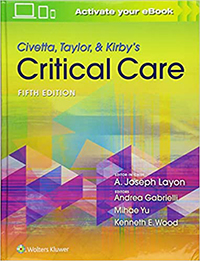
Edition 5 (2017)
A. Joseph Layon, Andrea Gabrielli, Mihae Yu, Kenneth Wood
Covering every problem encountered in today’s intensive care unit, this leading critical care textbook presents the knowledge and expertise of more than 350 global experts in this fast-changing field. Beginning with the social aspects of medicine, it then discusses monitoring and organ system pathobiology followed by specific diseases states/syndromes. Each chapter begins with immediate concerns and proceeds to broader-based discussions of relevant pathophysiologic and clinical issues.
KEY FEATURES:
Features new chapters on Critical Care Implications in Acute Care Surgery, The Obstetric Patient, and Brain Death and Management of the Potential Organ Donor; all chapters thoroughly revised including up-to-date discussions of what happens after the patient leaves the ICU.
Covers surgical critical care more thoroughly than any other text.
Includes expert coverage of pharmacology, nutrition, toxicology and the environment, disaster management, point-of-care testing, bedside ultrasound, surgical infections, and much more.
Presents information in a reader-friendly manner, streamlining the print text to focus on the material most important for bedside care in the ICU.
Expertly edited by leaders in every area of critical care: Dr. Mihae Yu (surgery), Dr. A. Joseph Layon (internal medicine), and Drs. Layon and Andrea Gabrielli (anesthesiology), who are joined in this edition by Dr. Kenneth Wood (internal medicine).
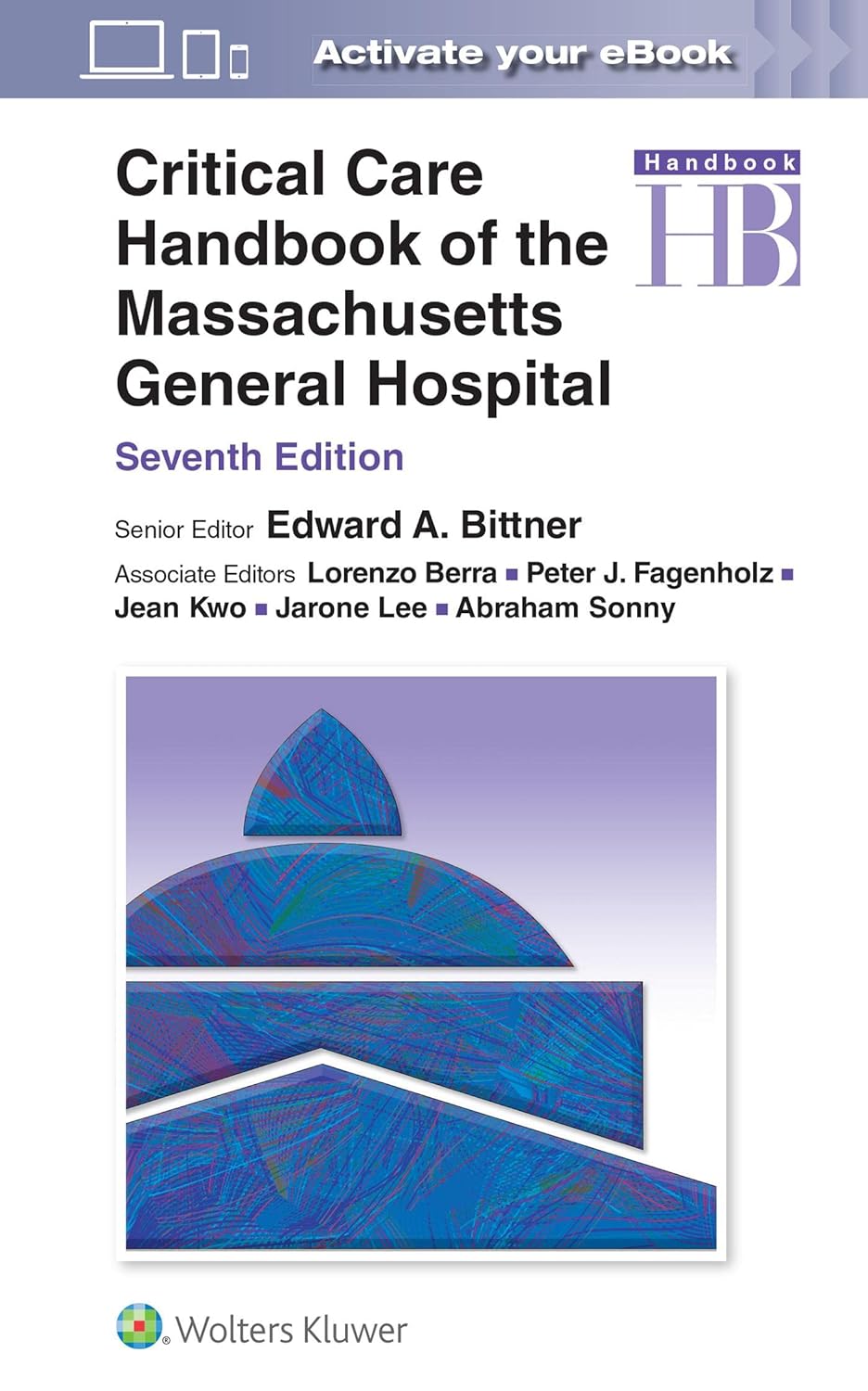
Edition 7 (2023)
Edward Bittner
With concise, full-color coverage of this rapidly enlarging field, Critical Care Handbook of the Massachusetts General Hospital, Seventh Edition, is your go-to guide for practical, complete, and current information on medical and surgical critical care. Edited by Drs. Edward A. Bittner, Lorenzo Berra, Peter J. Fagenholz, Jean Kwo, Jarone Lee, and Abraham Sonny, this user-friendly handbook is designed for rapid reference, providing reliable, hospital-tested protocols that reflect today's most advanced critical care practices. An at-a-glance outline format and portable size make it an essential manual for medical students, residents with rotations in ICUs, and physicians and nurses who work in critical care.
Reflects a multidisciplinary approach throughout, in a convenient size for on-the-go reference
Contains well-written, comprehensive coverage of general principles, specific considerations such as ARDS, and health care services such as ICU handoffs and transitions
Uses an efficient outline format with bolded key words and concepts
Includes new chapters on critical care management of COVID-19, heart failure, and pulmonary hypertension
Written by MGH attendings, fellows in critical care, nurses, and residents in anesthesia, critical care, and pain medicine, with input from surgery, pulmonary care, pediatrics, neurology, and pharmacy
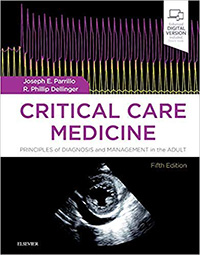
Edition 5 (2019)
Joseph Parrillo, Philip Dellinger
Now completely revised to bring you up to date with the latest advances in the field, Critical Care Medicine: Principles of Diagnosis and Management in the Adult, 5th Edition, delivers expert, practical guidance on virtually any clinical scenario you may encounter in the ICU. Designed for intensivists, critical care and pulmonology residents, fellows, practicing physicians, and nurse practitioners, this highly regarded text is clinically focused and easy to reference. Led by Drs. Joseph Parrillo and Phillip Dellinger, the 5th Edition introduces numerous new authors who lend a fresh perspective and contribute their expertise to that of hundreds of top authorities in the field.
Includes new chapters on current applications of bedside ultrasound in the ICU, both diagnostic and procedural; mechanical assist devices; and extra-corporeal membrane oxygenation (ECMO).
Contains new administrative chapters that provide important information on performance improvement and quality, length of stay, operations, working with the Joint Commission, and more.
Features new videos and images that provide visual guidance and clarify complex topics.
Keeps you up to date with expanded chapters on echocardiography in the ICU and valvular heart disease, including TAVR.
Includes separate chapters on mechanical ventilation of obstructive airway disease and acute respiratory distress syndrome (ARDS) – including the many recent changes in approach to positive end expiratory pressure setting in ARDS.
Covers key topics such as patient-ventilator synchrony and non-invasive ventilation for treating chronic obstructive pulmonary disease patients with acute respiratory failure.
Reflects the recent literature and guidance on amount of fluids, type of fluid, vasopressor selection, mean arterial pressure target, and decision on steroid use in septic shock.
Provides questions and answers in every chapter, perfect for self-assessment and review.
Enhanced eBook version included with purchase. Your enhanced eBook allows you to access all of the text, figures, and references from the book on a variety of devices.
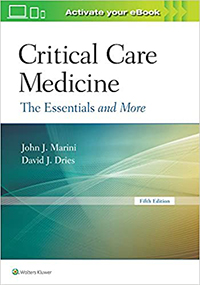
Edition 5 (2018)
John Marini, David Dries
With a full-color design and concise, easy-to-read chapters, Critical Care Medicine: The Essentials and a Bit More covers the core elements of critical care, with a unique focus on the pathophysiology underlying clinical disorders and how pathophysiologic concerns affect treatment options. There is much here that’s new: brand-new content, expanded discussions, and more graphical elements than ever before. Chapters follow a consistent structural template, with discussions of diagnosis, instrumentation, treatment and management techniques, and more. Expertly and succinctly captures all the fundamentals of the field!
Designed primarily for use by students and residents, but also helpful for anyone already in practice.
Emphasizes the pathophysiologic elements and treatments of illness and injury.
Now with updated drug info and more substantial coverage of interventional radiology, pregnancy care, and organization of critical care.
Adds new, brief summaries that present opposing arguments of controversial points.
Topics range from intubation, ventilation, and pharmacotherapy, as well as drug overdoses, sepsis, gastrointestinal bleeding, and other crisis care scenarios.
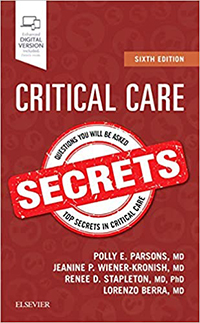
Edition 6 (2018)
Polly Parsons, Jeanine Wiener-Kronish, Lorenzo Berra, Renee Stapleton
For more than 30 years, the highly regarded Secrets Series® has provided students and practitioners in all areas of health care with concise, focused, and engaging resources for quick reference and exam review. Critical Care Secrets, 6th Edition, features the Secrets’ popular question-and-answer format that also includes lists, tables, and an easy-to-read style – making reference and review quick, easy, and enjoyable.
Fully updated throughout, with new chapters on neurological monitoring, obesity in the ICU, new ultrasound practices, ICU survivorship, and the latest cardiac technology such as ventricular assist and percutaneous support devices.
Written and fully updated by clinical and thought leaders in critical care who have contributed chapters in their areas of expertise.
The proven Secrets Series® format gives you the most return for your time – concise, easy to read, engaging, and highly effective.
Covers the full range of essential topics in critical care for in-training or practicing professionals, including anatomy, physiology, immunology, and inflammation – fundamentally important topics in the effective care of critically ill patients.
Top 100 Secrets and Key Points boxes provide a fast overview of the secrets you must know for success in practice and on exams.
Portable size makes it easy to carry with you for quick reference or review anywhere, anytime.
Expert Consult™ eBook version included with purchase. This enhanced eBook experience allows you to search all of the text, figures, and references from the book on a variety of devices.
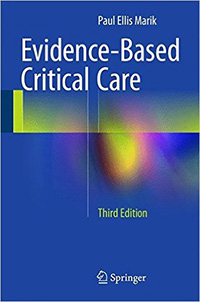
Edition 3 (2015)
Paul Ellis Marik
This is the premier evidence-based textbook in critical care medicine. The Third Edition features updated and revised chapters, numerous new references, streamlined content, and new chapters on key topics such as the new paradigm in critical care medicine, cardiac output monitoring, surgical optimization, vital signs, and arterial blood gas analysis. The book maintains the author’s trademark humor and engaging writing style and is suitable for a broad and diverse audience of medical students, residents, fellows, physicians, nurses, and respiratory therapists who seek the latest and best evidence in critical care.
From reviews of previous editions:
“This is an excellent introduction to the concept of evidence-based medicine...The writing is clear, logical, and highly organized, which makes for fast and enjoyable reading. I believe this book will get daily use in most intensive care units, by a wide range of readers.” –Respiratory Care
“This is one of the most comprehensive handbooks on critical care medicine with a strong emphasis on evidence base…Overall, this book should be useful for junior doctors or intensive care trainees who are starting their term in an intensive care unit.” –Anaesthesia and Intensive Care
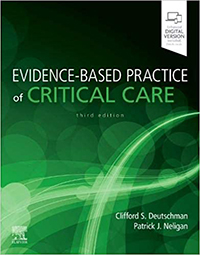
Edition 3 (2019)
Clifford Deutschman, Patrick Neligan
Approach any critical care challenge using a practical, consistent strategy based on best practices with Evidence-Based Practice of Critical Care, 3rd Edition. Unique, question-based chapters cover the wide variety of clinical options in critical care, examine the relevant research, and provide recommendations based on a thorough analysis of available evidence. Drs. Clifford S. Deutschman and Patrick J. Nelligan, along with nearly 200 critical-care experts, provide a comprehensive framework for translating evidence into practice, helping both residents and practitioners obtain the best possible outcomes for critically ill patients.
Covers a full range of critical care challenges, from routine care to complicated and special situations.
Helps you think through each question in a logical, efficient manner, using a practical, consistent approach to available management options and guidelines.
Features revised and updated information based on current research, and includes all-new cases on key topics and controversies such as the use/overuse of antibiotics, drug resistance in the ICU, non-invasive mechanical ventilation, frequency of transfusions, and duration of renal replacement therapies.
Provides numerous quick-reference tables that summarize the available literature and recommended clinical approaches.
Enhanced eBook version included with purchase. Your enhanced eBook allows you to access all of the text, figures, and references from the book on a variety of devices.
Tap into the expertise of nearly 200 critical-care experts who discuss the wide variety of clinical options in critical care, examine the relevant research, and provide recommendations based on a thorough analysis of available evidence.
Think through each question in a logical, efficient manner, using a practical, consistent approach to available management options and guidelines.
Find the information you need quickly with tables that summarize the available literature and recommended clinical approaches.
Navigate a full range of challenges from routine care to complicated and special situations.
Stay up to date with new issues and controversies such as the redefinition of sepsis • changing approaches to fluid administration • immune suppression in sepsis • monitoring the microcirculation • the long-term sequelae of critical illness • minimizing ventilator associated lung injury • the benefits of evidence-based medicine management guidelines • rapid response teams • and more.
Benefit from all-new sections covering persistent critical illness and the role of advanced practice nurses and physician assistants in the ICU.
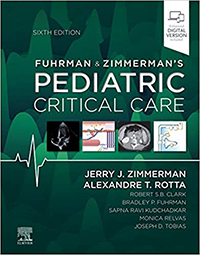
Edition 6 (2021)
Jerry Zimmerman, Alexandre Rotta
In the highly specialized field of caring for children in the PICU, Fuhrman and Zimmerman's Pediatric Critical Care is the definitive reference for all members of the pediatric intensive care team. Drs. Jerry J. Zimmerman and Alexandre T. Rotta, along with an expert team of editors and contributors from around the world, have carefully updated the 6th Edition of this highly regarded text to bring you the most authoritative and useful information on today’s pediatric critical care―everything from basic science to clinical applications
Contains highly readable, concise chapters with hundreds of useful photos, diagrams, algorithms, and clinical pearls.
Uses a clear, logical, organ-system approach that allows you to focus on the development, function, and treatment of a wide range of disease entities.
Features more international authors and expanded coverage of global topics including pandemics, sepsis treatment in underserved communities, specific global health concerns by region.
Covers current trends in sepsis-related mortality and acute care after sepsis, as well as new device applications for pediatric patients.
Provides ultrasound videos and more than 500 board-style review questions and answers on Expert Consult.
Enhanced eBook version included with purchase. Your enhanced eBook allows you to access all of the text, figures, and references from the book on a variety of devices.
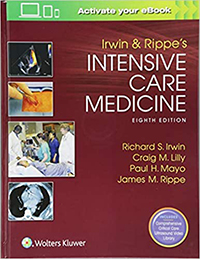
Edition 8 (2017)
Richard Irwin, Craig Lilly, Paul Mayo, James Rippe
With a focus on evidence-based, state-of-the-art information throughout, the eighth edition of Irwin and Rippe’s Intensive Care Medicine offers authoritative guidance to the wide variety of specialty physicians and non-physicians practicing in the adult intensive care environment. This comprehensive textbook covers both the theoretical and practical aspects of the field, and has been completely updated to provide encyclopedic, interprofessional coverage to support practitioners in every area of this complex field.
Features:
Approaches intensive care from an interprofessional, collaborative perspective, encompassing anesthesia, surgery, trauma, and neurology, as well as cardiovascular and medical intensive care.
Maintains a practical, clinically-oriented approach, with comprehensive sections on procedures, techniques, and ultrasound; minimally invasive monitoring; pharmacology, overdoses, and poisoning; infectious disease; transplantation; critical care consequences of agents of mass destruction; and many more.
Features many new chapters, and an entirely new section on Palliative Care and Ethical Issues in the Critical Care Unit.
Reflects the rising importance of point-of-care ultrasonography with five hours of expertly narrated video embedded into 23 relevant chapters, clearly depicting the ideal use of this tool for intensivists .
Includes a section on ICU Design, Organization, Operation, and Outcome Measures that addresses important changes and advances regarding safety, clinical practice guidelines, decreasing the cost of care, tele-ICU, and more.
Provides extensive updates reflecting advances in cardiovascular intensive care, surgical critical care, shock and trauma, and sepsis management.
Includes recommendations reflecting randomized controlled clinical trials, summarized, when possible, in quick-reference tables throughout.
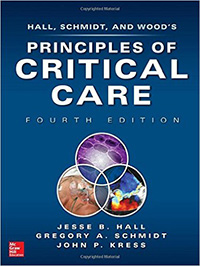
Edition 4 (2015)
Jesse Hall, Gregory Schmidt, John Kress
Quickly and accurately diagnose and treat the critically ill patient with guidance from the field's definitive text
"…Clearly the finest textbook available in the field." -- Critical Care Medicine journal
"…Very well done…unusually user-friendly…excellent…a significant contribution to the field. It should be placed not only in the critical care practitioner's library, but also in the rounds and nurses' conference rooms of critical care units." -- Journal of the American Medical Association
Considered the field's definitive text, Principles of Critical Care offers unmatched coverage of the diagnosis and treatment of the most common problems encountered in the practice of critical care. Written by expert critical care physicians who are also experienced teachers, the book features an organization, thoroughness, and clarity not found in any other reference on the topic. Within its pages, you will find comprehensive, authoritative discussion of every aspect of critical care medicine essential to successful clinical practice, ranging from basic principles to the latest technologies.
The fourth edition is highlighted by:
A new full-color presentation
NEW CHAPTERS on ICU Ultrasound, Extracorporeal Membrane Oxygenation, ICU-Acquired Weakness, Abdominal Compartment Syndrome, and Judging the Adequacy of Intravascular Volume
The addition of many new figures and diagnostic and treatment algorithms
In-depth, up-to-date descriptions of the unique presentation, differential diagnosis, and management of specific critical illnesses
A logical organ system approach that simplifies the search for thorough and practical information necessary to manage a patient’s specific condition
The integration of pathophysiology throughout the text
Content that reflects today’s interdisciplinary approach to critical care medicine
*Reviews are of previous editions
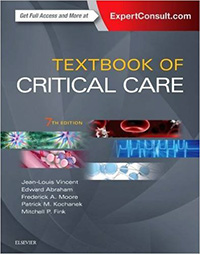
Edition 7 (2016)
Jean-Louis Vincent, Edward Abraham, Patrick Kochanek, Frederick Moore, Mitchell Fink
Comprehensive, concise, and readable, Textbook of Critical Care, 7th Edition, brings you fully up to date with the effective management of critically ill patients, providing the evidence-based guidance you need to overcome a full range of practice challenges. Drs. Jean-Louis Vincent, Edward Abraham, Frederick A. Moore, Patrick Kochanek, and Mitchell P. Fink are joined by other international experts who offer a multidisciplinary approach to critical care, sharing expertise in anesthesia, surgery, pulmonary medicine, and pediatrics. This highly acclaimed text offers ICU clinicians a new understanding of the pathophysiology of critical illness and new therapeutic approaches to critical care.
Features a wealth of tables, boxes, algorithms, diagnostic images, and key points that clarify important concepts and streamline complex information for quick reference.
Includes procedural videos online.
Expert Consult™ eBook version included with purchase. This enhanced eBook experience allows you to search all of the text, figures, and references from the book on a variety of devices.
Includes many new chapters on echocardiography, antibiotic stewardship, antiviral agents, coagulation and anti-coagulation, , telemedicine, extracorporeal membrane oxygenation (ECMO), and more.
Offers new coverage of biomarkers, bedside ultrasound, and the management of increasingly complex critically ill patients.
Provides new approaches to sepsis, acute kidney injury, and management of acute respiratory distress syndrome (ARDS), and other forms of respiratory failure.
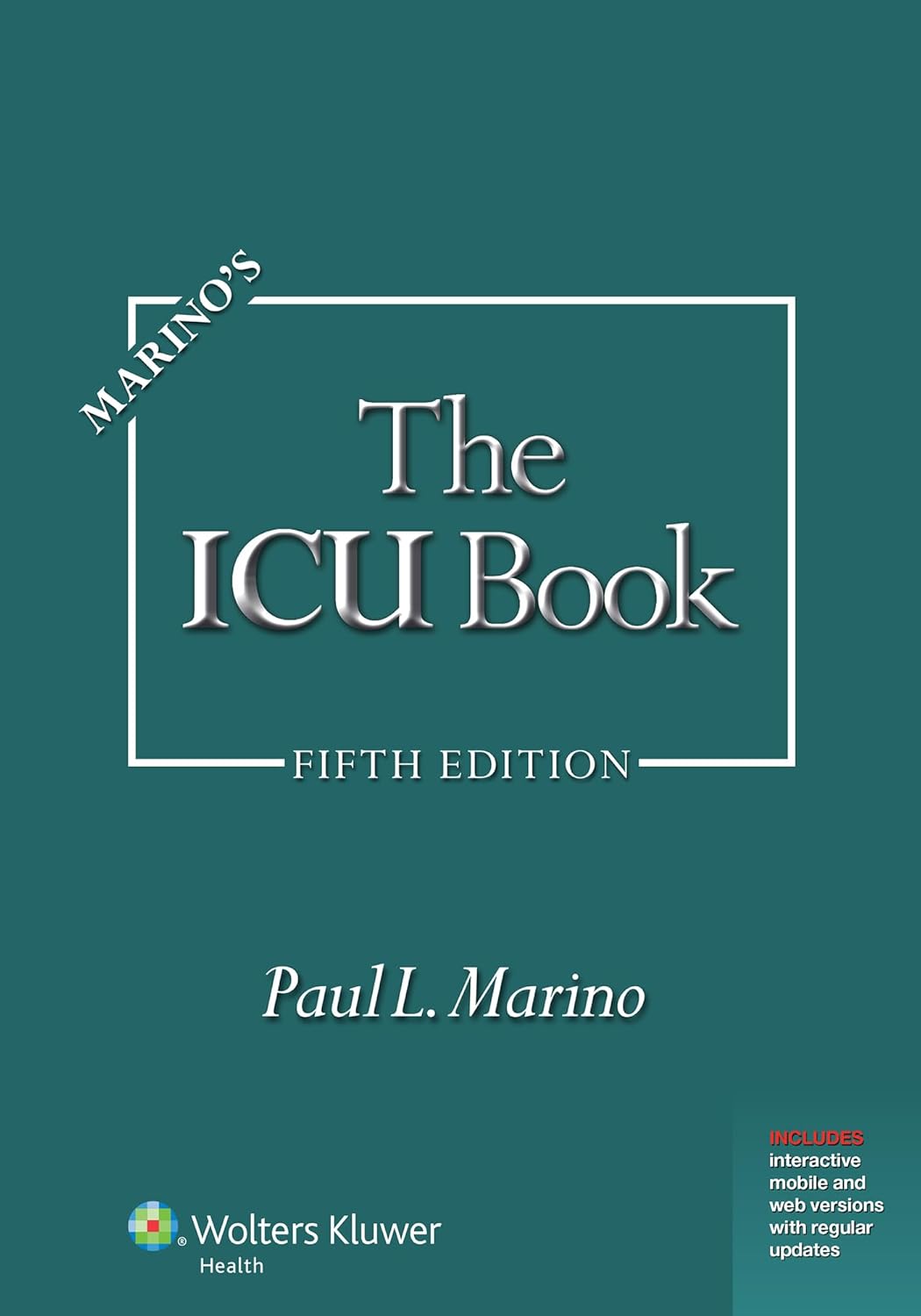
Edition 5 (2024)
Paul Marino
Dr. Paul L. Marino’s concise, engaging writing style is just one of many reasons that Marino’s The ICU Book is the best-selling reference in critical care. This highly regarded, full-color resource contains the essential information needed to care for patients in any ICU, regardless of the specialty designation of the unit. The newly revised Fifth Edition continues the focus on practical aspects of patient care and will appeal to anyone with an interest in the care of critically ill patients. The intended audience incudes medical students, interns and residents in medicine, surgery, and anesthesiology, critical care physicians and nurses, physician’s assistants, respiratory therapists, and paramedics.
Dr. Marino has been a practicing critical care specialist for 44 years, and the material in his book is a reflection of this vast experience.
The text has been completely rewritten and incorporates the latest concepts and most recent clinical practice guidelines.
Because this is a single-author text, the writing and style are consistent from chapter to chapter, and redundancies are held to a minimum.
New chapters have been added on fluid management, approaches to clinical shock, acute pulmonary embolism, liver failure, and acute pancreatitis.
As in prior editions, there are numerous illustrations and tables that highlight the material in the text, and each chapter ends with a section called “A Final Word” that presents a take-home message from the chapter.

